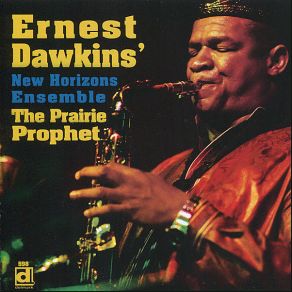The Prairie Prophet
Download links and information about The Prairie Prophet by Ernest Dawkins. This album was released in 2011 and it belongs to Jazz genres. It contains 7 tracks with total duration of 01:04:50 minutes.

|
|
|---|---|
| Artist: | Ernest Dawkins |
| Release date: | 2011 |
| Genre: | Jazz |
| Tracks: | 7 |
| Duration: | 01:04:50 |
| Buy it NOW at: | |
| Buy on iTunes $9.99 | |
Tracks
[Edit]| No. | Title | Length |
|---|---|---|
| 1. | Hymn for a Hip King | 8:11 |
| 2. | Sketches | 12:07 |
| 3. | Balladesque | 2:23 |
| 4. | Mal-Lester | 10:43 |
| 5. | Shades of the Prairie Prophet | 11:07 |
| 6. | Mesopotamia | 6:52 |
| 7. | Baghdad Boogie | 13:27 |
Details
[Edit]Some straight-ahead bop musicians want absolutely nothing to do with outside playing, and some avant-garde agitators thrive on total atonality and could care less about being even remotely accessible to jazz's mainstream. But there are also the avant-garde players who enjoy inside and outside playing equally, and love to integrate the two, which is what Chicago-based saxophonist/bandleader/composer Ernest Dawkins and his long-running New Horizons Ensemble do on The Prairie Prophet. This 2010 recording is neither totally avant-garde nor totally straight-ahead, but rather, is an appealing union of the inside and the outside. The eight-minute opener "Hymn for a Hip King" favors a straight-ahead post-bop aesthetic, but Dawkins' love of the outside really kicks in on the second track, "Sketches," and things continue to be quite unpredictable after that. "Mal-Lester" and the haunting "Mesopotamia" contain fairly accessible post-bop themes, while "Shades of the Prairie Prophet" is among the more abstract pieces on this 64-minute CD. Compositionally, a wide variety of influences continue to affect Dawkins, ranging from the Art Ensemble of Chicago to Sun Ra's Arkestra to Charles Mingus' groups, and Dawkins, true to form, maintains a refreshingly non-sectarian view of jazz whether he is playing the alto sax or the tenor sax. Dawkins (who composed all of the material on this album) reminds us that he is the essence of an inside/outside musician; he never shows a preference for one school of jazz over another, and he clearly realizes that the avant-garde and "the tradition" both have their place in jazz. Dawkins isn't afraid to keep listeners guessing, and the result is yet another exciting album from the Chi-Town explorer.